Who is Ali Ufkî (Albertus Bobovius), the Polish who notated the old Turkish music?
Wojciech Bobowski (Ali Beig) - Polish-born Ottoman music scholar and composer. He created a music book that ensures that many pieces of music belonging to his age and earlier are not lost.

(1610-1675) According to some sources, he was born in Lvov, Poland. He died in Istanbul. There is no certainty on the dates of his birth and death. His real name is Albert Bobowski; He was known as Ali Bey around the Ottoman palace and in Europe.
In his books written in Latin, his name is mentioned as Albertus Bobovius. According to his own statement, he was kidnapped by the Crimean Turks and sent to Istanbul as a prisoner. IV. It is thought that he came to Istanbul during the time of Murad. After becoming a Muslim, he continued his science and art studies in Enderun for nineteen years. He learned various Eastern and Western languages and religious and secular Turkish music. He showed mastery in playing the santur. He made composition studies and poetry experiments under the pseudonym Ufkî. At the end of nineteen years, he went to Egypt, there is no information about his life there.
Wojciech Bobowski or Ali Ufki (also Albertus Bobovius, Ali Bey, Santurî Ali Ufki; 1610 – 1675) was a Polish, later Ottoman musician and dragoman in the Ottoman Empire. He translated the Bible into Ottoman Turkish, composed an Ottoman Psalter, based on the Genevan metrical psalter, and wrote a grammar of the Ottoman Turkish language. His musical works are considered among the most important in 17th-century Ottoman music. In 1666 Bobowski also wrote a grammar of the Ottoman Turkish language.
After returning to Istanbul, Sultan İbrahim and IV. He worked as an instrument artist in the palace during the reign of Mehmed. IV. He became a civil servant during the reign of Mehmed; He acted as the translator of the sultan in the palace and war treaties until 1673. He was sent to many Western and Eastern countries as an officer.
Ali Ufki is a versatile idea and artist. He has produced many works in various fields as a music scholar, composer, linguist, encyclopedist, translator, memoirist, travelogue, and poet. He translated the Bible into Turkish. He learned Western Music and dealt with miniatures. Sources state that he speaks seventeen languages, including Latin, Greek, English, French, German, and Polish. In his works, he gives information about the life of the Ottoman sultans, Turkish customs, and the state system.
Mecmua-i Sâz ü Söz is his most important work. This work, whose only copy is in the British Museum in London, was not known in Turkey until 1948. By chance, historian Çağatay Uluçay found the work and introduced it with an article. Then the microfilm of the artwork was taken. It was also printed in 1976.
Mecmua-i Sâz ü Söz is primarily a music anthology; The book consists of notes of many musical pieces and folk poems. The author also gives information about the composers, poets, and periods of these works. His own compositions and poems are also in this book. In the writing of the musical pieces collected in 22 façades, a Western notation that goes from right to left and is written according to the key of "fa" is used. Most of the notated works were not known until 1948. 15.-17. Hundreds of musical products belonging to the 19th century have been saved from oblivion with the discovery of this book. In this respect, the work is of great value to Turkish music.
